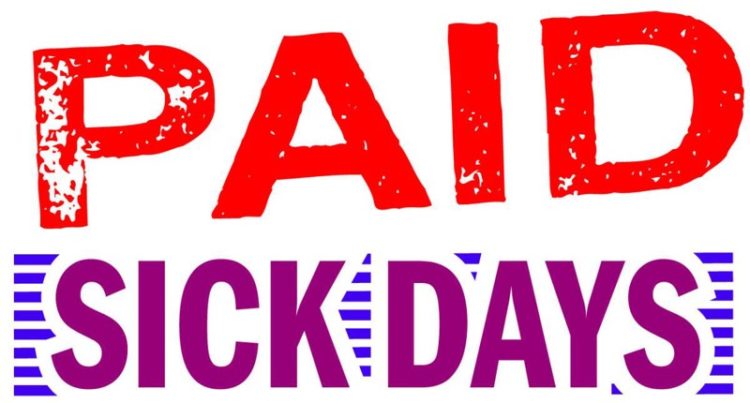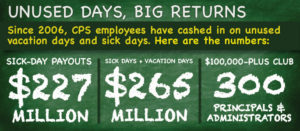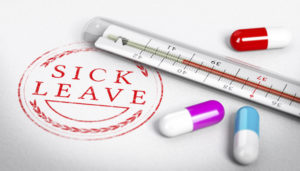Unused Sick Leave and Vacation Payouts are Breaking State Budgets Everywhere : A Well Thought Out Scream by James Riordan

When Bridgewater State University (a Massachusetts community college) President Dana Mohler-Faria retired in March of 2016, he received a payout for 1,250 unused sick days and vacation time earned over his 46-year career which came to $266,040 — in addition to an annual pension of more than $183,000 and a $100,000 consulting gig. The huge outcry resulted in Mohler-Faria refunding to the state fifteen weeks of what was declared “improperly accrued vacation time” and agreed to terminate his lucrative consulting contract.
Mohler-Faria was one of 10 state and community-college officials who received six-figure vacation and sick-time payments between 2011 and 2015. Just this week, the Board of Higher Education eliminated the practice of rolling unused vacation time into a sick-leave bank and will gradually reduce the maximum vacation allowance to 50 days, still over 50 percent more than the limit for most state employees.
 The University of Massachusetts, which is not governed by the Board of Higher Education, had previously limited accrued time off to 960 hours for non-union employees, but it remains unlimited for union workers — yet another reminder of why post-retirement benefits should never be subject to collective bargaining.
The University of Massachusetts, which is not governed by the Board of Higher Education, had previously limited accrued time off to 960 hours for non-union employees, but it remains unlimited for union workers — yet another reminder of why post-retirement benefits should never be subject to collective bargaining.
In Pennsylvania, a state police major who retired in October netted $142,315 for 242 sick days he never used. And in Florida, 45,000 eligible state workers are due to receive a total $154 million in sick leave payouts.
The accumulation of unused sick days and vacation time has become a huge problem for many state and local governments. In Massachusetts alone, as of last year taxpayers faced about $500 million in liability for unused sick and vacation time. Liabilities for public workers’ sick leave haven’t drawn as much attention as hulking pension and health care costs faced by states, but they still add stress to strained state and local budgets. In several states, giant payouts are prompting outrage and calls for changes from taxpayers and lawmakers.
Colleen Garry, a Democratic representative from Massachusetts, said she would like to see sick day payouts eliminated for public workers earning more than $100,000. “That is just greedy as far as I’m concerned,” Ms. Garry said.
Garry’s bill calls for limiting payouts to 15 percent of an employee’s annual salary. Regardless of what you might think of her proposal, Garry made a point that public officials everywhere should heed, saying that government should “pay public employees fairly during their working years and not push compensation into retirement packages.”
Public worker advocates, however, say that large payments are generally limited to police and fire officials and top management, with most retirees receiving far more modest sums. “It’s a small retirement benefit,” said Hetty Rosenstein, New Jersey director of the Communications Workers of America, a union representing public workers in the state.
 Such compensation is a rarity in the private sector, where more than a third of workers aren’t even eligible for paid sick leave, according to Thom Reilly, director of the Morrison Institute for Public Policy at Arizona State University.
Such compensation is a rarity in the private sector, where more than a third of workers aren’t even eligible for paid sick leave, according to Thom Reilly, director of the Morrison Institute for Public Policy at Arizona State University.
“It just seems we’ve created this incredible, huge divide in the private and public sectors,” Mr. Reilly said. “There needs to be some balance: less generous in the public sector and, for significant parts of the private sector, employees should have access to some type of sick leave.”
Massachusetts Governor Charlie Baker, a Republican, has proposed legislation that would cap sick leave accumulation at 1,000 hours for the state’s 42,000 executive branch employees. The approximately 5,800 executive-branch workers who already have accrued more than that would be grandfathered, though their sick time would be capped at the hours accrued at the time of the legislation’s passage. These changes would need to be negotiated through collective bargaining agreements with 11 unions.
It is difficult to quantify the scope and cost of sick leave payouts nationally because states, towns and counties have different policies for awarding these benefits. Mr. Reilly surveyed 140 of the country’s largest city and county governments in 2014 and found that 77% had no cap on the amount of unused sick leave employees were allowed to accrue and, in most cases, be remunerated for at retirement.
Governments often don’t budget for sick leave payouts, which can result in large, unexpected costs when longtime employees retire. In Jersey City, N.J., officials issued $25 million in special emergency notes between 2013 and 2015 to pay for retiring employees’ unused sick and vacation leave. Mayor Steven Fulop, who took office in 2013, has started contributing to reserves to cover the payouts, but the city’s estimated $116 million liability is only 14% funded.
Mr. Fulop, a Democrat, said the city is seeking to change its compensation policies through collective bargaining negotiations, but once such rules are in place, “it’s really hard to claw them back.”
In 2010, New Jersey capped sick day payouts for newly hired local and school employees at $15,000. Later that year, Republican Gov. Chris Christie refused a bill that would have extended the cap to all public workers, saying he wanted to completely eliminate the perk.
State lawmakers are currently considering bills to restrict or eliminate the practice. On Monday, Mr. Christie showed a willingness to compromise, and recommended capping sick day payouts for police and fire employees at their current accumulated balances or $7,500, whichever is greater.
Some states compensate unused sick days in ways other than cash payouts. Texas and Tennessee allow state workers to use sick leave to push up their retirement dates. Employees in West Virginia and Wisconsin can apply the unused days toward health insurance coverage.
In North Carolina, public workers are allowed to convert sick days to retirement credits, and career employees often retire with 18 months to two years of accumulated sick time.
Michigan, meanwhile, ended unused sick leave compensation for new state workers in 1980, but is still liable for nearly $36 million for 1,200 employees hired before the benefit was cut.
In Massachusetts, the issue flared up this March when the longtime president of Mount Wachusett Community College, Dan Asquino, cashed out his unused sick days plus $68,078 for 480 unused vacation hours for a total payment of $334,138, according to the college.
The college said the payouts were mandated by the state. Mr. Asquino said his payout was fair given his responsibilities and lengthy tenure as president. “The public should demand the best and the brightest and for that they must be willing to compensate accordingly,” he said in an email. “Otherwise, the public interest and safety is at peril.”
Kevin Preston, state director for the National Association of Government Employees union representing about 15,000 public workers in Massachusetts, said for lower earning employees, sick-day payouts help cover the bills after retirement.
The median payout per state employee in fiscal 2015 was $2,264, according to a state analysis.
“People are getting very modest amounts at the tail end of their very long career,” Mr. Preston said. “It’s not a windfall by any stretch of the imagination, it’s a hard-won benefit.”
___




No Comment